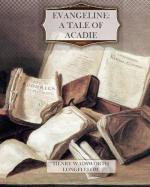Followed the old man’s song, and united the fragments together.
As in a church, when the chant of the choir at intervals ceases, 215
Footfalls are heard in the aisles, or words of priest at the altar,
So, in each pause of the song, with measured motion the clock clicked.
Thus as they sat, there were footsteps heard, and,
suddenly lifted,
Sounded the wooden latch, and the door swung back
on its hinges.
Benedict knew by the hob-nailed shoes it was Basil
the blacksmith, 220
And by her beating heart Evangeline knew who was with
him.
“Welcome!” the farmer exclaimed, as their
footsteps paused on the threshold,
“Welcome, Basil, my friend! Come, take
thy place on the settle
Close by the chimney-side, which is always empty without
thee;
Take from the shelf overhead thy pipe and the box
of tobacco; 225
Never so much thyself art thou as when, through the
curling
Smoke of the pipe or the forge, thy friendly and jovial
face gleams
Round and red as the harvest moon through the mist
of the marshes.”
Then, with a smile of content, thus answered Basil
the blacksmith,
Taking with easy air the accustomed seat by the fireside:—
230
“Benedict Bellefontaine, thou hast ever thy
jest and thy ballad!
Ever in cheerfullest mood art thou, when others are
filled with
Gloomy forebodings of ill, and see only ruin before
them.
Happy art thou, as if every day thou hadst picked
up a horseshoe.”
Pausing a moment, to take the pipe that Evangeline
brought him, 235
And with a coal from the embers had lighted, he slowly
continued:—
“Four days now are passed since the English
ships at their anchors
Ride in the Gaspereau’s mouth, with their cannon
pointed against us.
What their design may be is unknown; but all are commanded
On the morrow to meet in the church, where his Majesty’s
mandate 240
Will be proclaimed as law in the land. Alas!
in the mean time
Many surmises of evil alarm the hearts of the people.”
Then made answer the farmer:—“Perhaps
some friendlier purpose
Brings these ships to our shores. Perhaps the
harvests in England
By untimely rains or untimelier heat have been blighted,
245
And from our bursting barns they would feed their
cattle and children.”
“Not so thinketh the folk in the village,”
said warmly the blacksmith,
Shaking his head as in doubt; then, heaving a sigh,
he continued:—
“Louisburg is not forgotten, nor Beau Sejour,
nor Port Royal.
Many already have fled to the forest, and lurk on
its outskirts, 250
Waiting with anxious hearts the dubious fate of to-morrow.
Arms have been taken from us, and warlike weapons
of all kinds;
Nothing is left but the blacksmith’s sledge
and the scythe of the mower.”
Then with a pleasant smile made answer the jovial
farmer:—
“Safer are we unarmed, in the midst of our flocks




